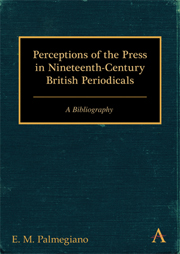Book contents
- Frontmatter
- Contents
- Preface
- Introduction
- Annotated Bibliography
- Ainsworth's Magazine, 1842–1854
- All the Year Round, 1859–1895
- Bentley's Miscellany, 1837–1868
- Bentley's Quarterly Review, 1859–1860
- Blackwood's Edinburgh Magazine, 1824–1900
- The British and Foreign Review, 1835–1844
- The British Quarterly Review, 1845–1886
- Chambers's (Edinburgh) Journal, 1832–1900
- The Contemporary Review, 1866–1900
- The Cornhill Magazine, 1860–1900
- The Dark Blue, 1871–1873
- The Dublin Review, 1836–1900
- The Dublin University Magazine, 1833–1880
- The Edinburgh Review, 1802–1900
- The Foreign Quarterly Review, 1827–1846
- The Fortnightly Review, 1865–1900
- Fraser's Magazine for Town and Country, 1830–1882
- Good Words, 1860–1900
- Hogg's (Weekly) Instructor, 1845–1856
- The Home and Foreign Review, 1862–1864
- Household Words, 1850–1859
- Howitt's Journal, 1847–1848
- The Leisure Hour, 1852–1900
- The London Quarterly Review, 1853–1900
- The London Review, 1829–1830
- Longman's Magazine, 1882–1900
- Macmillan's Magazine, 1859–1900
- The Modern Review, 1880–1884
- The Monthly Chronicle, 1838–1841
- Murray's Magazine, 1887–1891
- The National Review, 1855–1864
- The National Review, 1883–1900
- The New Monthly Magazine, 1821–1854
- The New Quarterly Magazine, 1873–1880
- The New Review, 1889–1897
- The Nineteenth Century, 1877–1900
- The North British Review, 1844–1871
- The Oxford and Cambridge Magazine, 1856
- The Prospective Review, 1845–1855
- The Quarterly Review, 1824–1900
- The Rambler, 1848–1862
- Saint Pauls, 1867–1874
- The Scottish Review, 1882–1900
- Tait's Edinburgh Magazine, 1832–1855
- Temple Bar, 1860–1900
- The Theological Review, 1864–1879
- Titan: A Monthly Magazine, 1856–1859
- The Westminster Review, 1824–1900
- Key to Indexes
- Author Index
- Subject Index
Household Words, 1850–1859
from Annotated Bibliography
Published online by Cambridge University Press: 05 May 2012
- Frontmatter
- Contents
- Preface
- Introduction
- Annotated Bibliography
- Ainsworth's Magazine, 1842–1854
- All the Year Round, 1859–1895
- Bentley's Miscellany, 1837–1868
- Bentley's Quarterly Review, 1859–1860
- Blackwood's Edinburgh Magazine, 1824–1900
- The British and Foreign Review, 1835–1844
- The British Quarterly Review, 1845–1886
- Chambers's (Edinburgh) Journal, 1832–1900
- The Contemporary Review, 1866–1900
- The Cornhill Magazine, 1860–1900
- The Dark Blue, 1871–1873
- The Dublin Review, 1836–1900
- The Dublin University Magazine, 1833–1880
- The Edinburgh Review, 1802–1900
- The Foreign Quarterly Review, 1827–1846
- The Fortnightly Review, 1865–1900
- Fraser's Magazine for Town and Country, 1830–1882
- Good Words, 1860–1900
- Hogg's (Weekly) Instructor, 1845–1856
- The Home and Foreign Review, 1862–1864
- Household Words, 1850–1859
- Howitt's Journal, 1847–1848
- The Leisure Hour, 1852–1900
- The London Quarterly Review, 1853–1900
- The London Review, 1829–1830
- Longman's Magazine, 1882–1900
- Macmillan's Magazine, 1859–1900
- The Modern Review, 1880–1884
- The Monthly Chronicle, 1838–1841
- Murray's Magazine, 1887–1891
- The National Review, 1855–1864
- The National Review, 1883–1900
- The New Monthly Magazine, 1821–1854
- The New Quarterly Magazine, 1873–1880
- The New Review, 1889–1897
- The Nineteenth Century, 1877–1900
- The North British Review, 1844–1871
- The Oxford and Cambridge Magazine, 1856
- The Prospective Review, 1845–1855
- The Quarterly Review, 1824–1900
- The Rambler, 1848–1862
- Saint Pauls, 1867–1874
- The Scottish Review, 1882–1900
- Tait's Edinburgh Magazine, 1832–1855
- Temple Bar, 1860–1900
- The Theological Review, 1864–1879
- Titan: A Monthly Magazine, 1856–1859
- The Westminster Review, 1824–1900
- Key to Indexes
- Author Index
- Subject Index
Summary
Edited by Charles Dickens and followed by All the Year Round, the popular six-penny Household Words assessed the French press and petitioned for inexpensive reading rooms for the British “unknown public” described in its pages by Wilkie Collins.
1. [Dickens, Charles and W. H. Wills]. “Valentine's Day at the Post Office.” 1 (1850): 6–12.
Announced that 70 million newspapers passed annually through the post office because some were sent more than once. Demand came from press coverage of births and deaths, crimes and accidents, current vanities and social changes.
2. [Forster, John]. “Francis Jeffrey.” 1 (1850): 113–18.
Reminisced about the start of the Edinburgh Review, intended by founders Jeffrey, Francis Horner, Sydney Smith, and Henry Brougham to stimulate serious thinking on serious subjects. Editor Jeffrey inaugurated the “forcible style of criticism” by paid contributors (10 guineas a sheet, later 20), setting “the all-important principle of a perfect independence of his publisher'scontrol.”
3. [Crowe, Joseph Archer]. “A Paris Newspaper.” 1 (1850): 164–67.
Chose the Constitutionnel (40,000 copies daily) as the prototype of Paris newspapers. Their offices were neater than London ones cluttered with foreign gazettes, parliamentary reports, and reference books. The French preferred to sell their tribunes by subscription, so forms were available in the post office. The Advertising Company of Paris bought the last page of every paper of any consequence.
- Type
- Chapter
- Information
- Perceptions of the Press in Nineteenth-Century British PeriodicalsA Bibliography, pp. 320 - 326Publisher: Anthem PressPrint publication year: 2012



